| Thomas Kinsella (1928-2021)
Life
| 1928- ; b. 4 May, Dublin, in a family traditionally employed at Guinness Brewery, Dublin; descended from Kinsellas (or Kinchellas) of Tullow, Coolatin, Tinahely and Farnese in Co. Wicklow and the Casserlys of Co. Westmeath on his mother’s side; grew up in the North Central Dublin of Inchicore, Kilmainham and Thomas St.; grandson of a cobbler and other Dublin shopkeepers and artisans; ed. Model School, Inchicore, and afterwards the O’Connell Schools (Christian Brothers); abandoned a Science Scholarship at UCD and entered Civil Service, 1946, reaching post of Asst. Principal officer in Dept. of Finance before retiring in 1965 [19 yrs service]; completed Arts degree at UCD through night-classes; his first poems published in the National Student while at UCD; met Eleanor Walsh of Enniscorthy, then working at UCD [‘in the basement’] during 1952; her in hospitalised for a year with TB of the throat; m. 1955, with children Sara [O’Malley], John and Mary; introduced to Liam Miller by Capt. Henry Neville Roberts and published The Starlit Eye (1952) with his Dolmen Press and later Poems (1956); issued Another September (1958), winner Guinness Poetry award and choice of Poetry Book Society; issued Moralities (1960); winner of Irish Arts Council Triennial Book Award, 1961; |
| |
| issued Downstream (1962), concerning a walk to Durrow, of Book of Durrow fame (‘arching the darkness for a landing place’); winner of Arts Council Award for American edition of poems and translations, 1962; Eleanor Kinsella successfully treated for myasthenia gravis, though with serious speech impairment, Chicago, 1962; Kinsella first travelled to America with six-month fellowship from Bórd Scoldireachtai Cómalairte, 1963; embarked on ‘main translation’ of Táin Bó Cuailnge; received Denis Devlin Memorial Award, 1965; elected MIAL, 1965; retired from Dept. of Finance and Civil Service; appt. poet-in-residence, Carbondale, S. Illinois, 1965 [1965-69], where he finished his trans. of the Táin, taking the Yellow Book of Lecan as his basic source [‘things became crystallised and distinct ... all the labour’]; wrote “Poetry Since Yeats” (1965); presented a paper on “The Irish Mind” to MLA (NY, Dec. 1966); issued Wormwood (1966); issued Nightwalker and Other Poems (1968) - received Guggenheim fellowship in 1968-69; issued The Táin (1969), ill. by Louis le Brocquy; appt. Professor of English, Temple College [err. University], Philadelphia, 1970; |
| |
| acted as director of Dolmen and Cuala presses for Liam Miller and afterwards fnd. Peppercanister to publish his own verse, 1972; issued Butcher’s Dozen (1972), being the first volume of the privately-printed Peppercannister series and written in response to the “Bloody Sunday” atrocity perpetrated by British paratroopers in Derry on 30 Jan. 1972 (and condoned by Widgery hearing), with a reading of the same at the Clonard Monastery, in the Ardoyne, Belfast; awarded Guggenheim Fellowship, 1971-72; pub. “The Divided Mind” (1973), in which he characterises the examples of Yeats and Joyce as the major models and options for contemporary Irish writers; issued Vertical Man (1973); issued A Technical Supplement (1976), an esoterically personal collection; returned to Ireland, 1976; continued Peppercannister series with The Messenger (1978), printed with a cover based substituting a Guinness label for the papal crest on the Jesuit pious publication of the same name; followed with Song of the Psyche (1985), Her Vertical Smile (1985), and Out of Ireland (1987), a meditation on Irish identity; participated prominently in the Wood Quay protest against destruction of Viking remains in Dublin, 1979; |
| |
| issued St Catherine’s Clock (1987), and jointly re-issued the foregoing as as Blood and Family (OUP 1988); ed. with own translations, The New Oxford Book of Irish Verse (OUP 1986), supplying a lengthy preface; issued Collected Poems (1996); Peppercanister Press subsumed in J. F. Deane’s Dedalus Press; issued The Pen Shop (1997), poetry pamph.; papers held at Emory University (Atlanta; acq. 1996; Librarian, Stephen Enniss); there is a head by Louis le Brocquy in the RDS; first winner of Translation Prize of European Poetry Academy, April 2001; issued Marginal Economy (2006), viewing contemporary life through eyes of Marcus Aurelius; awarded Freedom of the City of Dublin, issued A Dublin Documentary (2007), part poetry, part memorabilia; issued Selected Poems (2007), which notably omits Butcher’s Dozen, became the Poetry Society Recommendation [later remarks that ‘The Widgery report was a great insult [and] I stand over my decision to write [it]’]; his Prose Occasion 1951-2006 (2009) was edited by Andrew Fitzsimons; |
| |
| received the Freedom of the City of Dublin, along with Louis le Brocquy in 2007; he received the Ulysses Medal at University Collegte, Dublin [UCD] in 2008; he was the subject of a public celebration of his life and work at the Gate Theatre, 27 July 2007 attended by the majority of his literary Irish contemporaries - who read his poetry, including Colm Toibin, Eavan Boland, Eiléan Ní Chuilleanáin, and others - at which he himself read from Belief and Unbelief; there is a documentary on Kinsella made by Seán Ó Mordha, assisted by Seán Ó Coileain and with an appearance from Nuala Ní Dhomhnaill; received D.Litt hon. degree from TCD, presented by Mary Robinson, Chancellor (TCD); d. 15 Dec. 2021, at Blackrock Clinic, nr. his home in Booterstown; there was an obituary by Gerald Smyth in The Irish Times. DIW DIL FDA OCIL |
| [ top ] |
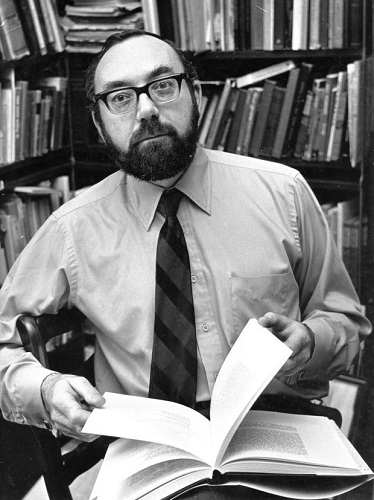 |
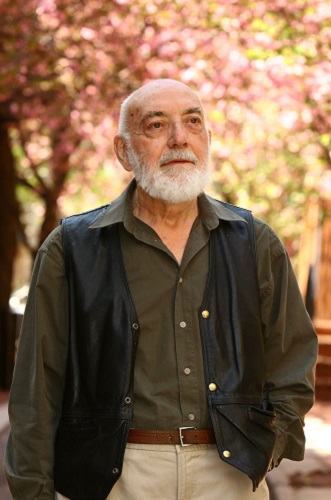 |
| See and hear Kinsella reading three short poems - being ‘two prayers’ from Belief and Unbelief and another unpublished - in the week of his Ulysses medal award 2007 (Poetry Ireland/RTE) at YouTube - online. |
| See also a short film of Kinsella with his wife Eleanor recalling their early life together (RTE - Personal Places: Arts Lives - YouTube online. |
Works
| Poetry |
| Trade editions |
- The Starlit Eye (Dublin: Dolmen Press 1952) [pamph.].
- Three Legendary Sonnets (Dublin: Dolmen Press 1952).
- Poems (Dublin: Dolmen Press 1956).
- Another September (Dublin: Dolmen Press; Chester Springs, Penn: Dufour 1958) [Poetry Book choice]; Do., [rev. edn.] (Dublin: Dolmen Press; OUP 1962).
- Moralities (Dublin: Dolmen Press 1960).
- Poems and Translations (NY: Atheneum Press 1961).
- Downstream (Dublin: Dolmen Press; OUP 1962), 63pp
- Wormwood (Dublin: Dolmen Press 1966).
- The Death of a Queen (Dublin: Dolmen Press 1966).
- Nightwalker (Dublin: Dolmen Press 1967) [ltd. edn. of 1,000].
- Nightwalker and Other Poems (Dublin: Dolmen Press 1968) [86pp.].
- Tear (Cambridge UP 1969).
- Notes from the Land of the Dead and Other Poems (Dublin: Cuala Press 1972; NY: Knopf 1973).
- ‘Butcher’s Dozen: A Lesson for the Octave of Widgery (Peppercannister No. 1; 26 April 1972).
- New Poems, 1973 (Dublin: Dolmen Press 1973), 69pp.
- Selected Poems 1956-1968 (Dublin: Dolmen Press 1973), 110pp., Do. (London & NY: OUP 1974) [var. Poems 1956-1968].
- Finistere (Dublin: Dolmen Press 1972), [ltd. edn. 250; designed by Hugh Kearns & Liam Miller].
- One and Other Poems (Dublin: Dolmen Press 1979) [being Peppercannister 2nd Ser.].
- Peppercanister Poems 1972-1978 (Winston-Salem NC: Wake Forest UP 1979, rep. 1986), 159pp.
- Poems 1956-73 (Dublin: Dolmen Press; Winston-Salem, NC: Wake Forest UP 1979).
- One Fond Embrace (Dublin: Deerfield Press; Gallery Press 1981) [afterwards as Peppercanister 13, 1988].
- Blood and Family (Oxford & London: OUP 1988) [four Peppercanister pamphs.].
- Collected Poems (Oxford: OUP 1996), 335pp.
- A Dublin Documentary (Dublin: O’Brien Press 2006), 111pp. [new poems & memorabilia, incorp. some from New Poems 1973].
- Selected Poems (Manchester: Carcanet Press 2007), 194pp.
|
| Selected and Collected Editions |
- Selected Poems 1956-1968 (Dublin: Dolmen Press 1973), 110pp., Do. (London & NY: OUP 1974) [var. Poems 1956-1968].
- Poems 1956-73 (Dublin: Dolmen Press; Winston-Salem, NC: Wake Forest UP 1979).
- Collected Poems (Oxford: OUP 1996), 335pp.
- Selected Poems (Manchester: Carcanet Press 2007), 194pp. [see Contents pages - as attached]
|
| Translations |
- trans. The Breastplate of St Patrick (Dublin: Dolmen Press 1954), and Do. [another edn.] as Faeth Giadha: The Breastplate of St Patrick (1957), ill. Garrit van Gelderen.
- trans., The Exile of the Sons of Usnech (Dublin: Dolmen Press 1954).
- trans., Thirty Triads, translated from the XII Century Irish (Dublin: Dolmen Press 1955).
|
Translations include in Gregory A. Schirmer, ed., After the Irish: An Anthology of Poetic Translation (Cork UP 2009), 500pp. |
| [ top ] |
| Poetry pamphlets (Peppercanister series) |
- Butcher’s Dozen: A Lesson for the Octave of Widgery [Peppercanister 1] (Dublin: Peppercanister 1972), 8pp., and Do. [new edn.] (Dublin: Dedalus Press 1992), 22pp. [500 copies].
- A Selected Life [Peppercanister 2] (Dublin: Dolmen Press 1972), 8pp. [on Seán Ó Riada; edn. of 1,000 in green wrappers].
- Vertical Man: A Sequel to A Selected Life [Peppercanister 3] (Dublin: Dolmen Press 1973), [14pp.; 350 in wrappers; 100 signed specially bound].
- The Good Fight: A Poem for the Tenth Anniversary of the Death of John F. Kennedy [Peppercanister 4] (Dublin: Dolmen Press 1973), 23pp. [signed & ltd. to 125 copies].
- One [Peppercanister 5] (Dublin: Dolmen Press 1974), 28pp., ill. [drawing by Anne Yeats; ltd. edn. 750].
- A Technical Supplement [Peppercanister 6] (Dublin: Dolmen Press 1976), [46pp.].
- Song of the Night and Other Poems [Peppercanister 7] (DublinDolmen Press 1978), 19pp. [ltd. edn. of 300; library edn. of 50 in slip case on handmade paper, full bound in Basil; additional poem in author’s MS].
- The Messenger [Peppercanister 8] (Dublin: Dolmen Press 1978), 25pp. [ltd. edn. 640 copies].
- Songs of the Psyche [Peppercanister 9] (Dublin: Dolmen Press 1985), 46pp.; [350 copies in wrappers and 50 signed leather-bound copies].
- Her Vertical Smile [Peppercanister 10] (Dublin: Peppercanister 1985), 23pp. [three bindings: paper, buckram of which 50 copies, and leather].
- Out of Ireland: A Metaphysical Love Sequence [Peppercanister 11] (Dublin: Peppercanister 1987), 31pp.
- St Catherine’s Clock [Peppercanister 12] (Dublin: Peppercanister 1987), 27pp. [ltd. edn. of 350].
- One Fond Embrace [Peppercanister 13] (Dublin: Dedalus Press 1988), 21pp. [200 hb.; 500 in paper wrappers].
- Personal Places [Peppercanister 14] (Dublin: Dedalus Press 1990), 24pp.
- Poems from Centre City [Peppercanister 15] (Dublin: Peppercanister 1991), 24pp. [Do., OUP 1994, 69pp.].
- Madonna and Other Poems [Peppercanister 16] (Dublin: Peppercanister 1991), 24pp. [400 ltd. edn; 200 hb.].
- Open Court [Peppercanister 17] (Dublin: Dedalus Press; 1991), 17pp. [ltd. edn. of 200 hb; 400 pb.].
- The Dual Tradition: An Essay on Poetry and Politics in Ireland [Peppercanister, No. 18] (Manchester: Carcanet 1995), vii, 129pp.
- The Pen Shop [Peppercanister 19] (Dublin: Dedalus Press; Manchester: Carcanet Press 1997), 15pp.
- The Familiar [Peppercanister 20] (Dublin: Dedalus Press; Manchester: Carcanet 1999), [24pp.].
- Godhead [Peppercanister 21] (Dublin: Dedalus Press; Manchester: Carcanet 1999), [24pp.].
- Citizen of the World [Peppercanister 22] (Dublin: Dedalus Press; Manchester: Carcanet 2000), 28, [3]pp.
- Littlebody [Peppercanister 23] (Dublin: Dedalus Press; Manchester: Carcarnet Press 2000), 27pp. [incls. “Breakdown”, “Shop Shut”, “Glenmacnass”, et al.].
- Marginal Economy [Peppercanister 24] (Dublin: Dedalus Press; Manchester: Carcanet; USA: Dufour 2006), 34pp.
- Readings in Poetry [Peppercanister 25] (Dublin: Dedalus Press; Manchester: Carcanet; USA: Dufour 2006), 49pp. [on Shakespeare, Sonnets 29 & 30, W. B. Yeats, “The Tower”, and T. S. Eliot, “The Love Song of J. Alfred Prufrock”].
- Man of War [Peppercanister, 26] (Dublin: Dedalus Press 2007), 30pp. [ltd. edn. of 500].
- Belief and Unbelief [Peppercanister, 27] (Dublin: Dedalus Press 2007), 24pp.
|
| |
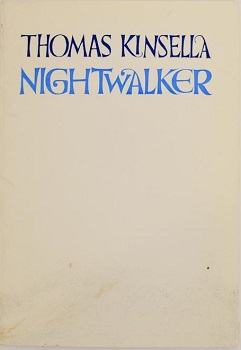 |
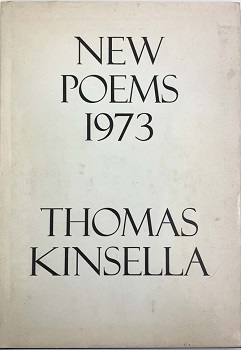 |
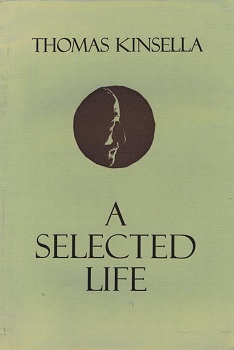 |
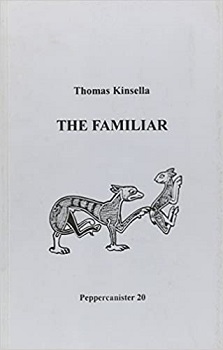 |
| Nightwalker (Dolmen 1967) |
New Poems (Dolmen 1973) |
Peppercannister Ser., No. 2 |
Peppercannister Ser., No. 20 |
|
Peppercanister - per series
|
FIRST SERIES: Butcher’s Dozen (Dublin: Peppercanister 1972); Vertical Man (Dublin: Peppercanister 1973); The Good Fight (Dublin: Peppercanister 1973) [all jointly issued as Fifteen Dead (Dolmen 1979)]. |
SECOND SERIES: One (Dublin: Peppercanister 1974); A Technical Supplement (Dublin: Peppercanister 1976); Song of the Night and Other Poems (Dublin: Peppercanister 1978) [all jointly issued as One, and Other Poems (Dolmen 1979)]. |
THIRD SER.: The Messenger (Dublin: Peppercanister 1978); Song of the Psyche (Dublin: Peppercanister 1985); Her Vertical Smile (Dublin: Peppercanister 1985); Out of Ireland: A Metaphysical Love Sequence (Dublin: Peppercanister 1987); St Catherine’s Clock (Dublin: Peppercanister 1987) [issued jointly as Blood and Family (OUP 1988; ISBN 0-19-282182-2)]; [...,] Belief and Unbelief [Peppercannister No.27; Dedalus Press 2007), 24pp. |
See also Peppercanister Poems 1972-1978 (Winston-Salem NC: Wake Forest UP 1979, rep. 1986), 159pp. Note: The Peppercannister series has been issued by Dedalus Press since 1988, while retaining the Peppercanister imprint with Dedalus variously cited as publisher and distributor. |
| Criticism |
- ‘The Irish Writer’, in Éire-Ireland, 2, 2 (Summer 1967), rep. in W. B. Yeats & Thomas Kinsella, Davis, Mangan, Ferguson?: Tradition and the Irish Writer (Dublin: Dolmen Press 1970), 72pp.
- Catalogue note on Louis le Brocquy in Brian O’Doherty, The Irish Imagination 1959-1971 [Rosc Exhib. Cat.] (1971).
- ‘The Divided Mind’ (1973), first published in Irish Poets in English, ed. Seán Lucy (Mercier 1973), pp.208-18; rep. in Poetry and Ireland since 1800, A Source Book, ed. Mark Storey (1988), pp.207-216; rep. in David Pierce, ed., Irish Writing in the Twentieth Century: A Reader (Cork UP 2000), pp.810-14.
- ‘The Poetic Career of Austin Clarke’ in Irish University Review, 4, 1 [“Austin Clarke Issue”] (Spring 1974), pp.128-36.
- ‘Austin Clarke’, in Dictionary of Irish Literature, Robert Hogan (Dublin: Gill & Macmillan 1979), pp.156-61.
- ‘An Anecdote and Some Reflections,’ in Genres of the Irish Literary Revival, ed. Ronald Schleifer ([London:] Pilgrim Books 1980), pp.179-78.
- Preface to David Lampe & Dennis Mahoney, eds., Five Irish Poets (White Pine Press; Dedalus [?1990]).
- ‘Poems of Samuel Beckett’, in Journal of Beckett Studies, 2, 2 (1993), pp.15-18.
- ‘Thomas Kinsella’ [short piece] in Krino, ‘The State of Poetry’ [“Special Issue”], ed. Gerald Dawe & Jonathan Williams (Winter 1993), pp.30-33 [being an extract from The Dual Tradition].
- The Dual Tradition: An Essay on Poetry and Politics in Ireland [Peppercanister, No. 18] (Manchester: Carcanet 1995), vii, 129pp.
- Prose Occasions 1951-2006, ed. Andrew Fitzsimons (Manchester: Carcanet Press 2009), 235pp.
|
| Miscellaneous |
- trans., The Sons of Usnech (Dublin: Dolmen Press [Nov.] 1954), and Do. (Dolmen Press [March] 1960), ill. Bridget Swinton.
- ed., with John Montague, Dolmen Miscellany of Irish Writing (Dublin: Dolmen 1962).
- trans., The Táin [Dolmen Edns. No. IX] (Dublin: Dolmen 1969), ill. Louis le Brocquy; and Do., re-issued in smaller format as The Tain (London & NY: OUP 1970) [infra].
- trans., An Duanaire: Poems of the Dispossessed 1600-1900, selected by Seán Ó Tuama (Dublin: Dolmen 1981; Phil: Pennsylvania UP 1981) [rep. by OUP 1985, 1990].
- ed. with numerous of his own translations, The New Oxford Book of Irish Verse (OUP 1986), 454pp.
- contrib. to Gerald Dawe & Michael Mulreany, eds., The Ogham Stone: An Anthology of Contemporary Ireland, introduced by Brian Farrell (Dublin: IPA 2001), 240pp.
- A Dublin Documentary (Dublin: O’Brien Press 2006), 112pp., ill.
|
| See Kinsella’s letter to the Editors of New York Review of Books (24 Sept. 1987) in response to Denis Donoghue’s review of New Oxford Book of Irish Verse (26 Feb. 1987) - and Donoghue’s answer [as attached]. |
|
See also his contribution to Pat Boran, ed., Watching the River Flow: A Century of Irish Poetry [1999], updated in Flowing, Still : Irish Poets on Irish Poetry (Dublin: Dedalus Press 2009). |
[ top ]
| The Táin [editions & related printings] |
- The Táin translated from the Irish by Thomas Kinsella; with brush drawings by Louis Le Brocquy / Dolmen Editions IX (Dublin: Dolmen Press 1969), [2], 294, [2]p., 3 pls., ill. facsims., maps.
- Táin Bó Cuailnge [in association with the Dolmen Press] (London & NY: Oxford UP 1970), xxvii, 283pp., Bibliography, p.[xxiv], ill., maps (some col.) [21cm].
- Do. [another edn.] (OUP 1977, 2002), xxvii, 282pp., ill. [20cm] [pb., 20 cm]
- Do. [2nd edn.] Pennsylvania UP 1982) [details as in OUP 1977 Edn., supra].
|
| Related printings |
- The Great Táin: a translation by Thomas Kinsella from the Irish (Dublin: Dolmen Press 1965), 8pp. [22.7cm.]; ‘fifty proof copies’ of specimen pages from “The Táin, published Dublin: Dolmen Press, 1969, the ext being altered in final published version and a different setting of type used; title page printed in black and blue.
- Cuchulainn’s boyhood deeds: from the Táin translated by Thomas Kinsella from the Irish; with drawings by Louis le Brocquy (Dublin: Dolmen Press 1968), [8], 16pp., ill., 29 cm [50 copies; priv. circ.].
- The Dolmen Press presents The Táin, Thomas Kinsella’s translation adapted and read by the author [programme] ([Dublin]: [Peacock Theatre] [1969]), [4]pp., ill. [30.5cm.]; designs […] by Louis le Brocquy from the Dolmen Press edition of “The Táin to be published in Dublin on 4 September 1969].
|
—See Quotations for Translator’s Note & Introduction from the 1970 Edn. - as infra.
|
Discography |
- Poems 1956-2006 (Claddagh Records 2007), 2 CDs.
|
[ top ]
Criticism
| Forthcoming; Adrienne Leavy, ed., Thomas Kinsella [Essay Collection on his Poetry] (2020) - contribs. incl. Alex Davis, Brian Caraher, Paul Gosling, Mary O’Malley, Lucy Collins, Gerald Dawe, Andrew Fitzsimons, Gerard Smyth, Hugh Haughton, Tomas Dillon Redshaw and Derval Tubridy. [FB notice of 17.10.2019] |
|
| |
- Donald Davie, ‘First Fruits: The Poems of Thomas Kinsella’, in Irish Writing, 37 (Autumn 1957), pp.47-58.
- Hensley C. Woodbridge, ‘Thomas Kinsella, a Bibliography’, in Éire-Ireland 2, 2 (Summer 1967), pp.122-33.
- John Reese Moore, ‘Thomas Kinsella’s Nightwalker: A Phoenix in the Dark,’ in The Hollins Critic, V, 4 (October 1968), pp.3-6.
- Robin Skelton, ‘The Poetry of Thomas Kinsella’, in Éire-Ireland, 4, 1 (Spring 1969), pp.86-108.
- Herbert V. Fackler, ‘Nineteenth-Century Sources for the Deirdre Legend’, Éire-Ireland, 4, 4 (Winter 1969), pp.56-63.
- John Montague, ‘Ulster Bull Fight’, review of Tain, in The Guardian (17 Nov. 1970) [q.p.; review of Táin].
- Thomas Dillon Redshaw, ‘The Wormwood Revisions’, in Éire-Ireland, 6, 2 (Summer 1971), pp.111-56.
- Maurice Harmon, The Poetry of Thomas Kinsella (Dublin: Wolfhound 1974), and Do. [sub-titled ‘With Darkness for a Nest’] (N.J.: Humanities Press 1974).
- Calvin Bedient, ‘Notes From the Land of the Dead’ [rev. article], in NY Times Books Review (16 June 1974), p.7.
- Edna Longley, ‘Searching the Darkness: The Poetry of Richard Murphy, Thomas Kinsella, John Montague, and James Simmons’, in Douglas Dunn, ed., Two Decades of Irish Writing (1975), pp.118-53.
- Seamus Deane, ‘The Appetites of Gravity: Contemporary Irish Poetry’, in Sewanee Review, 84 (1976), pp.199-108.
- Hugh Kenner, ‘Thomas Kinsella: An Anecdote and Some Reflections’, in Genre, 12 (1979), 591-99.
- Peggy F. Broder, ‘Breaking the Shell of Solitude: Some Poems of Thomas Kinsella,’ in Éire-Ireland, 14, 2 (Summer 1979), pp.80-92.
- Dillon Johnston, ‘A Response to Hugh Kenner: Kinsella’s Magnanimity and Mean Reading’, in Genre, 13, 4 (1980), pp.531-37.
- Arthur E. McGuinness, ‘“Bright
Quincunx Newly Risen”: Thomas Kinsella’s Inward “I”’, in Éire-Ireland, 15, 4 (Winter 1980). pp.106-25.
- Seamus Heaney, ‘A Tale of Two Islands: Reflections on The Irish Literary Revival’, in P. J. Drury, ed., Irish Studies, I (Cambridge UP 1980), pp.1-20 [espec. 18ff.].
- Daniel O’Hara, ‘An Interview with Thomas Kinsella’, in Contemporary Poetry, 4, 1 (1981), pp.1-18.
- Robert F. Garratt, ‘Fragilities and Structures: Poetic Strategy in Thomas Kinsella’s “NightWalker and “Phoenix Park’, Irish University Review, 13, 1 (1983), pp.88-102.
- Seamus Deane, ‘Thomas Kinsella: ‘Nursed out of Wreckage’, Celtic Revivals: Essays in Modern Irish Literature 1880-1980 (London: Faber 1985), pp.135-44.
- Dillon Johnson, Irish Poetry After Joyce (Notre Dame UP; Dolmen 1985) [q.p.].
- Robert F. Garratt, ‘Poetry at Mid-Century, I: Thomas Kinsella’, in Modern Irish Poetry: Tradition and Continuity from Yeats to Heaney (California UP 1986), pp.167-97.
- Seamus Deane, A Short History of Irish Literature (Hutchinson 1986) [‘Contemporary Literature, 1940-80’], pp.234-37.
- Ciaran Carson, ‘Hibernian Assumptions’, review of Kinsella, ed., The New Oxford Book of Irish Verse (OUP [n.d.]), in Irish Review, 1 ([1986), pp.99-102.
- ‘Thomas Kinsella Issue’, Tracks, 7 (1987) [incl. W. J. McCormack, ‘Politics or Community’, et al.].
- Arthur McGuinness, ‘Fragments of Identity: Thomas Kinsella’s Modernist Imperative’, Colby Quarterly, 23, 4 (1987), pp.185-205.
- Joep Leerssen, ‘Táin and Táin: The Mythical Past and the Anglo-Irish’, in Joris Duytschaever and Geert Lernout, eds., History and Violence in Anglo-Irish Literature [Conference of 9 April 1986; Costerus Ser. Vol. 71] (Amsterdam: Rodopi 1988), pp.19-45.
- Geert Lernout, ‘The Dantean Paradigm, Thomas Kinsella and Seamus Heaney’, in C. C. Barfoot & Theo D’Haen, eds., The Clash of Ireland, Literary Contrasts and Connections (Amsterdam: Rodopi 1989), pp.248-64.
- Carol Tattersall, ‘Thomas Kinsella’s Exploration in Notes from the Land of the Dead of His Sense of Alienation from Women’, in Canadian Journal of Irish Studies, 16, 2 (December 1990), pp.79-91.
- Thomas H. Jackson, The Whole Matter, Poetic Evolution of Thomas Kinsella (Dublin: Lilliput; Syracuse UP 1995), 220pp.
- Brian John, Reading the Ground: The Poetry of Thomas Kinsella (Washington: Catholic UP 1996), 275pp.
- Maurice Harmon, ‘“Move, if you move, like water”: The Poetry of Thomas Kinsella, 1972-88’, in Elmer Andrews, ed., Contemporary Irish Poetry: A Collection of Critical Essays (London: Macmillan 1996), pp.194-213.
- Steven Matthews, ‘Thomas Kinsella’s Poetic of Unease’ [chap.], in Irish Poetry: Politics, History, Negotiation: The Evolving Debate 1969-Present (Basingstoke: Macmillan 1996) [q.pp.].
- Donatella Abbate Badin, Thomas Kinsella (NY: Twayne 1996), 226pp.
- Catríona Clutterbuck, guest ed., Irish University Review [Thomas Kinsella Special Issue], Vol. 31, No. 1 (Spring/Summer 2001) [see contents].
- Alex Davis, ‘Thomas Kinsella and the Pound Legacy: His Jacket on the Cantos’, in Irish University Review [Thomas Kinsella Special Iss. ; Vol. 31, No. 1] (Spring - Summer, 2001), pp.38-53 [available at JSTOR - online; accessed 05.01.2022].
- Seamus Heaney, ‘Thomas Kinsella’, in Finders Keepers: Selected Prose 1971-2001 (London: Faber & Faber 2002), pp.239-45.
- Maurice Harmon, ‘Jousting with Evil’, in The Yearbook in English Studies (2005), q.pp.
- Andrew Fitzsimons, The Sea of Disappointment: Thomas Kinsella’s Pursuit of the Real (UCD Press 2008), 272pp. [Assoc. Prof. Gakushuin U., Tokyo; TCD diss. 2005].
- Maurice Harmon, Thomas Kinsella: Designing for the Exact Needs (Dublin: IAP 2008), 292pp.
- Irish Studies Review, “Kinsella at Eighty” [Special Issue; guest ed. Derval Tubridy] 16, 3 (August 2008), [231]-367pp. [see contents.
- Colm Tóibín, ‘The Poetry of an Empty Space’ [on Thomas Kinsella], in The Irish Times (25 June 2011), Weekend, p.12 - [rep. of “The Dark 16th Century”, in Dublin Review, 43, Summer 2011 - see extract].
- Amy Galvin, ‘The Passing of Time in Thomas Kinsella’s Early Poetry’, in Voicing Dissent : New Perspectives in Irish Criticism, ed. Sandrine Brisset & Noreen Doody (Dublin: Irish Academic Press 2012) [Chap. 2].
- Andrew Fitzsimons, ‘Thomas Kinsella’, in The Cambridge Companion to Irish Poets, ed. Gerald Dawe (Cambridge UP 2017), pp.224-39.
- [...]
- Adrienne Leavy, ‘An Interview with Thomas Kinsella’, in New Hibernia Review/Iris Eireannach Nua (Samhradh/Summer 2011), pp.136-48; Do. [rep. ‘From the Archives’], in New Hibernia Review (Spring 2021), pp.55ff.
- Adrienne Leavy, ‘Thomas Kinsella: Eliciting Order from Experience’, in The Irish Times (13 Jan. 2016) [as attached].
|
| |
See also remarks in M. L. Rosenthal & Sally M. Gall, The Modern Poetic Sequence (q.d.) - from which an extract on Hugh MacDiarmid, Thomas Kinsella and Basil Bunting is given in Twentieth-Century British and Irish Poetry: Hardy to Mahon, ed. Michael O’Neilll & Madeleine Callaghan (Malden, Mass: Wiley-Blackwell 2011); Sean Crosson, ‘The Given Note’: Traditional Music and Modern Irish Poetry (Cambridge Scholars Publishing Jan. 2008).
|
[ top ]
| See Google images of Kinsella online - always noting that some of these are not our Thomas Kinsella and others are mis-captioned [accessed 28.06.2011]. |
[ top ]
Bibliographical details
Irish University Review, 31, 1 [“Thomas Kinsella Special Issue”, Guest Editor, Catríona Clutterbuck] (Spring/Summer 2001). CONTENTS, Catríona Clutterbuck, Introduction [vii ]; Dennis O’Driscoll, ‘His Wit: Humour and Satire in Thomas Kinsella’s Poetry’ [1]; Donatella Abbate Badin, ‘“Rhyme and Rhythm and Beauty[”]: The Abandoned Formalism of Kinsella’s Early Poetry 1956-1968’ [19]; Alex Davis, “Thomas Kinsella and the Pound Legacy: His Jacket on the Cantos’ [38]; Ian Flanagan, ‘“Tissues of Order”: Kinsella and the Enlightenment Ethos’ [54]; Maurice Harmon, ‘“From Basin Lane to Old Vienna: Place”: Transcendence and Counterpoint in Thomas Kinsella’ [78]; Peter Denman, ‘Significant Elements: “Songs of the Psyche” and “Her Vertical Smile”’ [95]; Thomas Kinsella, “The Affair’ [110]; “As an nGéibheann” [111]; Donatella Abbate Badin, ‘From An Interview with Thomas Kinsella’ [113]; Jefferson Holdridge, ‘“Homeward, Abandoned”: The Aesthetics of Home and Family in Thomas Kinsella’ [116]; Lucy Collins, ‘“A Little of What We Have Found”: Kinsella, Women, and the Problem of Meaning’ [135]; Ruth Ling, ‘Re-familiarizing The Familiar: From Effigy to Elegy in the Recent Marriage Poems of Thomas Kinsella’ [153]; Derval Tubridy, ‘Difficult Migrations: The Dinnseachnas of Thomas Kinsella’s Later Poetry’ [172]. Also Book reviews [187-209].
Irish Studies Review, 16, 3 - “Kinsella at Eighty” [Special Issue, guest ed. Derval Tubridy] (August 2008), [231]-367pp. [Preliminary:] ‘Introduction: “Keep us alert / for the while remaining”: Kinsella at eighty’; [231]; Catriona Clutterbuck, ‘Scepticism, faith and the recognition of the “Patriarch-Mother” in the poetry of Thomas Kinsella’; [245]; Andrew Fitzsimons, ‘“Let the Fall begin”: Thomas Kinsella”s European dimension’; [267]; Lucy Collins, ‘“Never altogether the same. But the same”: strategies of revision in Thomas Kinsella”s Notes from the Land of the Dead’; [283]; Dillon Johnston, ‘Kinsella’s Dublins and the Stone Mother’; [295]; Ian Flanagan, ‘“Hearing the American Voice”: Thomas Kinsella and William Carlos Williams’; [305]; David Wheatley, ‘“All is emptiness / and I must spin”: Thomas Kinsella and the romance of decay’; [329]; Derval Tubridy, ‘Thomas Kinsella: A Selected Bibliography 2008’; [335]. Also, Tubridy, pencil port. of Thomas Kinsella [229; front.; poems by Floyd Skloot and David Wheatley.]
See also “Finestere” [1972], rep. in The Celtic Consciousness , ed. Robert O’Driscoll (Dublin: Dolmen; [Toronto]: Cannongate 1981), pp.xxvii-xxxi.
[ top ]
Commentary
[See separate file, infra]
Quotations
[See separate file, infra]
[ top ]
References
Seamus Deane, gen. ed., The Field Day Anthology of Irish Writing (Derry: Field Day 1991), Vol. 3, selects “The Irish Writer [625-29; see also under Daniel Corkery, q.v.]; from Another September, “Another September, “Baggot Street Deserta; from Moralities, “Song, “Mirror in February; from Wormwood, “Wormwood; from Notes from the Land of the Dead and Other Poems, “Ancestor, “Tear, “Hen Woman, “St Pauls possessed; from One and Other Poems, “His Fathers Hands; from Out of Ireland, “The Furnace, “Entrance; BIOG, 1432; b. Dublin 1928 [no further family information], attended UCD and thereafter entered Civil Service; left position as assistant principal officer in Dept. of Finance to take up post at Southern Illinois Univ., 1965; began teaching at Temple Univ., Philadelphia, 1970; co-founder with Liam Miller of Dolmen Press; awards incl. Denis Devlin Memorial Award, Guinness Poetry Award; Irish Arts Council Triennial Book Award, and two Guggenheim Fellowships; lives in Co. Wicklow. WORKS & COMM [as supra].
Sundry anthologies, Robin Skelton, ed., Six Irish Poets (OUP 1962) incls. selection of Kinsella’s poetry, with others [Austin Clarke, Richard Kell, John Montague, Richard Murphy & Richard Weber]; David Livingstone & Anne Sexton, eds., Poems (OUP 1968); Maurice Harmon, ed., Irish Poetry After Yeats: Seven Poets (Dublin: Wolfhound Press 1979); Andrew Carpenter & Peter Fallon, eds., The Writers: A Sense of Place (Dublin: O’Brien Press 1980), incls. four love poems, being literal translations from the Irish (‘My own dark head …’), with photo-port., pp.98-100. “Finestere was printed in Robert O’Driscoll, ed., The Celtic Consciousness (Dolmen/Canongate 1981), pp.xxvii-xxxi [with a poem by John Montague, both arising from a conference of 1979].
Patrick Crotty, ed., Modern Irish Poetry: An Anthology (Belfast: Blackstaff Press 1995), selects “Chrysalides” [160]; from Notes from the Land of the Dead: “Hen Woman” [160], “Ancestor” [163], “Tear” [164]; from One: “38 Phoenix Street” [167], “His Father’s Hands” [168]; from Anniversaries, “1956” [172]; from “The Messenger [173]; from Out of Ireland: “Harmonies” [174]; from “One Fond Embrace” [174].
Booksellers
Peter Ellis (Cat. 10; 2002) lists A Selected Life (Dublin: Peppercanister 1972); 6pp. [100 bound copies signed]; A Technical Supplement (Dublin: Peppercanister 1976) [550 signed copies]; Song of the Night and Other Poems (Dublin: Peppercanister 1978), 15pp. [each £95; remainder reduced to £75 in 2004.]
[ top ]
Notes
Two traditions? [1]: Kinsella wrote in his Introduction to The New Oxford Book of Irish Verse (1986) that ‘Irish tradition is a matter of two linguistic identities’ (p.xxvii), and dismissed the so-called ‘Northern Ireland Renaissance’ as ‘largely a journalistic entity’ (p.xxx). He was also scathing about Terence Brown’s conception of ‘Northern Voices’ conceived as a separate tradition, and spoke of the language-shift as having ‘left a majority audience divided from the past’ (p.xlvii), affirming instead the essential continuity of Irish writing.
Two traditions? [2]: Robert Greacen wrote to The Irish Times (18 Aug. 1995) defending John Hewitt against charges of bigotry laid against him by Kinsella in The Dual Tradition [see further under Greacen, infra.]
Bards all: Kinsella’s poem “Finestere” takes Amergin’s chant in Leabhar Gabhála as its basis (see Paddy Bushe, ‘A resonant tradition, some Gaelic poetry of Uíbh Ráthach’, in Daniel O’Connell: Political Pioneer, ed. Maurice R. O’Connell, 1991, pp.86-97; p.88).
Nightwalkers: ‘The Nightwalker’ is also the title of a dramatic ballad by Gerald Griffin (see Poems by Gerald Griffin Dublin: Gill 1940).
Peppercanister: Kinsella set up shop to sell the Peppercanister Poems from 47 Percy Lane. The Familiar (No. 20); Godhead (No. 21); Citizen of the World (No. 22); Littlebody (No.23.)
Academy Prize: Kinsella was the first winner of the European Poetry Academy:’s triennial prize for publication of poetry in several countries, a copy of his poetry in Finnish being presented in Dublin (The Irish Times, 29 April, 2001; with photo of the poet and Mr Phillippe Jones, presenting, at Joyce Tower, Sandycove; see also under J. F. Deane.)
Kith & Kin?
| Thomas W. Kinsella (1796-1865) |
- Born: 1796, Gorey, County Wexford, Ireland
- Parents
- Thomas Kinsella, 1775-1806 [q.v.]
- Mary Kinsella, 1775-1806 [q.v.]
- Siblings:
- Elisabeth (Kinsella) Lawless
- Married: Elizabeth (Lawless) Kinsella, June 3, 1827 (parish records list a Kinsley-Lawless marriage on 6 March 1827) [q.v.]
|
| Children: |
- Thomas Kinsella, 1833-1911 (baptised 27 August 1832)
- James Kinsella, 1834-1919 (baptised 13 July 1835)
- Elizabeth Kinsella, 1838-?
- Michael Kinsella, 1839-1928 (baptised 10 August 1839) [q.v.]
- Edward Kinsella, 1843-1933 (baptised 28 April 1844-parents John Kinsella and Elizabeth Lawless?)
- Edward Kinsella, baptised 18 January 1829 (parents Thomas Kinsley and Elizabeth Lawless)
|
| [TWK] lived in Townsland of Tinnashinna[gh] (170 acres), barony of Gorey, parish of Kilmakilloge, County Wexford; Tinnashinnagh is shown in Ordnance Survey maps about 2km north of Gorey and about 2km south of Kilanerin; emigrated to Baldwinsville, New York, 1847; moved to Funk’s Grove Township, McLean County, Illinois, 1857. Occupation: Farmer, Isaac Funk Farm, Funk’s Grove, Illinois; d. January 14, 1865, McLean County, Illinois; bur. St. Mary’s Cemetary, Bloomington, Illinois |
| Record supplied in Notre Dame / Powers - Ancestors - online; accessed 26.01.2023. |
[ top ]
|





